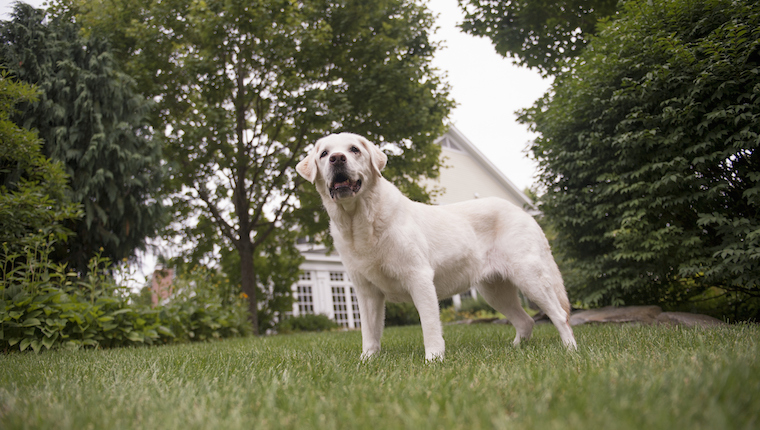What are the dog laws in Vermont? Does Vermont have dog laws? If you live in this state, you might be wondering what the law says about issues like rabies vaccination, dog bites, dog abandonment, or dog cruelty.
Read on for more information about dog laws in Vermont.
Rabies Vaccination Laws
Vermont requires that dogs and wolf hybrids receive vaccines for rabies. A licensed vet or vet tech must perform the vaccination. Animals must remain vaccinated throughout the duration of their life.
However, exemptions can be made for medical reasons. A vet can allow a dog to be exempt from rabies vaccinations due to health issues. In these cases, a vet can make the determination to give them medical exemption. This must always be done with written consent from the owner. Dogs with medical waivers are still unvaccinated for legal purposes.
Those found violating Vermont’s laws on rabies vaccinations may receive a fine of up to $500.
Unvaccinated animals who have suspected exposure to rabies likely face euthanasia. Potentially, they may be allowed to stay in a strict 10-day quarantine. If they develop rabies symptoms in this time, they will be euthanized.
Dog Bite Laws
Vermont is often referred to as a “one-bite” state. This is because, a dog’s owner will typically be liable only if they knew or should have known the dog was dangerous or had a tendency toward dangerous behavior. This means that in most cases, a first-time attack is considered a “free pass” — but after this point, the dog has documented dangerous behavior.
Dog owners are not responsible for attacks in which the dog was provoked or protecting the owner. This could include yelling at, hitting, or throwing objects at the dog. Additionally, if you were trespassing on private property and then were attacked by an otherwise contained dog, the dog’s owner would not be liable.
A dangerous dog, particularly a repeat offender, may be euthanized if this is determined to be in the best interest of the safety of the community.
Dog Abandonment Laws
In Vermont, animal abandonment is defined as leaving an animal intentionally in someone’s care, such as a vet or boarding kennel, then never coming to collect the animal. In these cases, the animal becomes the property of whoever they were abandoned in the custody of. They can then freely sell, keep, rehome or euthanize the animal. There are rarely charges for animal abandonment, but you will lose ownership of the animal.
Dog Cruelty Laws
In Vermont, many mistreatments of animals are legally considered animal cruelty. While some think animal cruelty only covers physical harm inflicted on an animal, Vermont’s laws also cover neglect and horrific crimes like sexual abuse.
Section 352 in Vermont makes animal cruelty punishable by a sentence of imprisonment of up to one year or a fine up to $2,000.00, or both. Second and subsequent convictions are punishable by a sentence of imprisonment of not more than two years or a fine of not more than $5,000.00, or both.
Aggravated animal cruelty holds a felony charge and harsher punishment. Aggravated animal cruelty is severe abuse, such as torturing or killing a dog. This crime is punishable by a sentence of imprisonment for up to five years or a fine up to $5,000.00, or both. Second and subsequent offenses are punishable by a sentence of imprisonment of up to ten years or a fine of not more than $7,500.00, or both.
As in the other 49 states, dogfighting is a felony in Vermont. This doesn’t apply only to those directly fighting their animals. It also applies to promoters or spectators of these events. Yes — watching a dogfight is also a felony.
Tethering Laws
Tethering is not prohibited in Vermont. However, there are restrictions preventing cruel treatment of dogs via tethering. Tethers should allow a dog to walk at least four times the length of their body. Tethers should attach to swivels to prevent entanglement. Additionally, tethers must attach to a well-fitted collar or harness to prevent choking or escape. The dog must have a shelter accessible while tethered, and they must be able to lie down within it.
How Vermont Dog Laws Rank Among Other States
Vermont ranks as a “middle-tier” state for animal protection laws by the Animal Legal Defense Fund. Out of all 50 states, Vermont comes in at number 19 for animal rights. There are plenty of good things to praise about Vermont’s animal rights laws. For example, the well-defined laws ensure that there are set rules for how much space, shelter, and care animals need to receive. Some states have no requirements for space or shelter, and so animals can be abused without any consequence.
However, Vermont does still have room to improve and grow. Vermont has no mandatory post-conviction forfeiture or possession bans. This means that, after one is charged with animal cruelty, there’s nothing preventing them from obtaining future animals. There is also no felony provisions for neglect, abandonment, or sexual assault of an animal. Additionally, social services professionals are not required to report suspected animal cruelty. So, while there’s plenty to love about Vermont’s laws about animals, there’s definitely space for Vermont to develop future laws.










